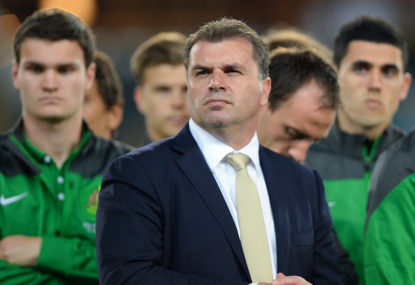Young excellence, promotion battles, and a happy farewell: The Australian team of the week from players around the globe
Even though St.Pauli ultimately lost a high-scoring affair, Jackson Irvine was a standout, as well as scoring a late goal.

There was a time, not too long ago, when Australian football was almost exclusively powered by patriotism.
It was a time where buzzwords like ‘spirit’, ‘passion’ and ‘grit’ were the main threads in our footballing fabric, where the underdog tag was warranted, celebrated and worn with unabashed pride.
We were the Socceroos – ready to punch above our weight, fight to the end and resolve to come back stronger should we come up second-best. This, in the eyes of the majority, was our shared and accepted identity.
Though things have changed. Or at least, are in the process of changing.
Judging from the reactions to the recent friendlies against Belgium and Saudi Arabia, the Australian footballing public has never been more self-aware, more analytical or more demanding of our doctrine. We know where we stand, where we’re going and what it’ll take for us to get there. We’re not afraid to prod and poke, to criticise and lament and call for alternatives.
The minority has become the overwhelming majority. Accepting the status quo is a thing of the past, and we’ve evolved beyond recognition as a result. It’s a movement of thought that has reached an unprecedented peak with the beginning of Ange Postecoglou’s reign. And it’s completely necessary given the watershed period our national team is going through.
Postecoglou finds himself in a privileged but precarious position: he has the power to usher in a new generation, but most importantly, to also cultivate a new footballing identity.
At the same time it also presents an opportunity for us as a collective nation to embrace this new Australia. To do away with old expectations, or lack thereof, and move towards a model that we can be proud of at a technical level, and not just in the nationalistic sense that we’ve become known for.
We saw this first ignite in Brazil, a campaign that taught us that success comes in different forms. Sure, what the Socceroos achieved at the World Cup was far from cause for mass celebration, but it was an indication of the sort of brand and culture we’ve been yearning for.
On the evidence of the past week, it’s a yearning that seems to be burning brighter and brighter.
The critical assessment of the Belgium and Saudi Arabia games has played out in line with this belief system. No punches were pulled, no lilies were gilded – the diagnoses were both honest and constructive.
Against Belgium, we were given a frank reminder of where we sit on the international spectrum. Despite a widespread feeling of optimism beforehand, the game in fact exposed our limitations all across the park.
There was no shying away from our defensive frailties and our lack of control and authority in the midfield. And although we scraped through with a much needed victory against the Saudis, it was a widely condemned performance – and rightly so.
We’re all in unanimous agreement that it was the type of game that we shouldn’t just be winning – but also controlling, dominating and dictating right to the very end. It’s a refreshingly progressive way of thinking about our football, and it’s exactly what’s needed to take things to the next level.
Thankfully, as Mitchell Grima wrote earlier this week, Postecoglou appears to be set on carrying out such a deed.
In saying this, I can’t help but think back to something an overseas friend told me after the World Cup game against the Netherlands. He was completely taken aback by the Socceroos’ performance; by their boldness of play, their willingness to attack, their controlled and purposeful build-up.
According to him, it was a very “un-Australian” performance.
A backhanded compliment it may have been, but it’s the sort of appraisal we should nail to the mast as a sign of the way forward.